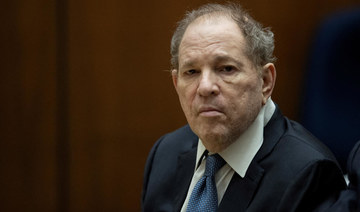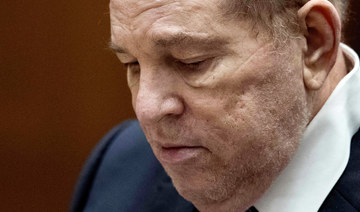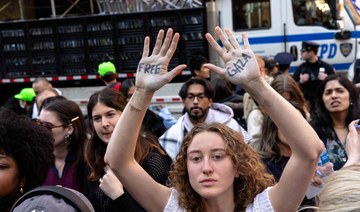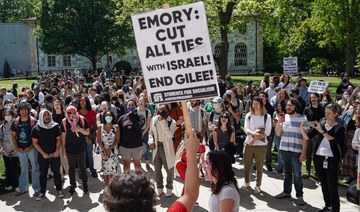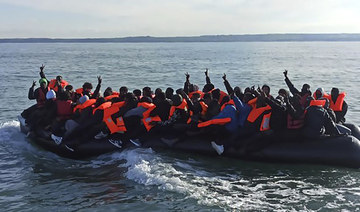PESHAWAR: When Durdana married for a second time and to a man of her own choosing, her parents threatened to kill her if she tried to see her new husband. They imprisoned her in their home, but she still had her mobile phone and had learned that a helpline for women had been set up. She noted the number and then one day when she was alone in the house, she called.
Nayab Hassan was on the other end. She had been trained how to answer the call. “Be gentle. Listen. Let them speak. Let them tell you what they want. Sometimes they are very emotional,” she said at the helpline center — located in the sprawling provincial parliament buildings in Pakistan’s deeply conservative Khyber Pukhtunkhwa province, where tribal councils still hand over young girls to settle disputes.
Not far from the border with neighboring Afghanistan, Khyber Pukhtunkhwa became the first province in Pakistan to set up a hotline for women that feeds directly into the provincial legislature.
It’s still a small operation. It began March 1 and so far there are only two operators, Hassan and Mehran Akbar. They take the information from the women and Shandana Naeem, a lawyer, follows up with advice and a network of free legal services.
They keep a careful log of all their calls, which average one a day so far, and while most have emanated from the provincial capital of Peshawar, several have come from more remote regions.
Durdana’s call was from Swat, a picturesque mountain region of clear blue lakes that ramble through valleys surrounded by imposing peaks. The area’s beauty is a stark contrast to its dark and violent history. It was in Swat where Pakistan’s Taliban briefly ruled, beheading police in the town square and where Malala Yousafzai was shot in the head for advocating girls’ education and criticizing the violent religious radicals as being frightened of female education.
The log book is carefully kept. It records names, dates, phone numbers and then their stories. Some are horrifying.
One woman, Aneesa, called to say that two years earlier her husband had thrown acid at her, stole her money and jewelry and fled to Saudi Arabia. She had moved in with her parents and now her eyesight was deteriorating from the acid attack; she needed medical assistance but had no money to pay for it.
Naeem said they helped her work through the red tape of getting a health card __ the first step to health care. But Aneesa’s call also made them realize the need to engage local health clinics and develop a network that would be willing to offer free health care, similar to their legal service network.
Naeem said most of the calls have been over property disputes, where women were being denied their inheritance.
The helpline was developed by Meraj Humayun Khan, a 70-year-old parliamentarian who has taken on her male colleagues to organize a women’s caucus in the provincial parliament. With the weight of the 22-member caucus behind her, Khan lobbied for the direct helpline to the legislature.
“We need to be in touch with their issues,” she said in an interview. “I can have a lot of ideas but it should come from them.”
The original call that prompted the helpline was a property dispute, said Khan, explaining that Pakistan’s inheritance laws — based on Islamic injunctions — allow male relatives priority and give a lesser share to women. And those women are often denied or intimidated by male relatives to forfeit even that lesser share.
The reason for locating the helpline in the provincial parliament was to collect data from women that would in turn bolster arguments for legislative changes. Khyber Pukhtunkhwa province is already behind on women’s right issues; lawmakers there have so far refused to pass an anti-domestic violence law that other provinces have approved.
Hard-line religious parties hold significant sway in Khyber Pukhtunkhwa. Jamaat-e-Islami and the Jamiat-e-Ulema Pakistan (whose madrassas or religious schools were favored by Afghanistan’s Taliban) are partners in the provincial coalition government.
The 22 women in the provincial parliament are there on quota seats reserved for women. No female candidate has been able to win a general election seat in the deeply conservative and tribal-dominated province.
Khan says she plans to run on a general seat in the 2018 elections, but she admits even those men who have championed and endorsed her candidacy have been met with skepticism and resistance.
“Everyone they talk to asks ‘That’s all well and good, but don’t you have any men who can run?’” she said. “It’s a humiliation for them to be represented by a woman. They think women don’t know anything about politics, about economics.”
The chairperson of Pakistan’s Human Rights Commission, Zohra Yusuf, says different provinces are making progress on women’s issues at different paces. Southern Sindh is Pakistan’s most progressive province in terms of laws to safeguard women, she said. Earlier this month the most populous province, Punjab, opened state-of-the-art shelters for women facing abuse at home.
Last year Pakistan passed a bill that essentially closed a loophole which used to allow so-called honor killers to escape punishment.
Yusuf said that despite the legislative progress, on-the-ground enforcement of these new laws still remains a significant hurdle.
“I think the governments are realizing it’s about time something needs to be done,” she said in a telephone interview. “Laws were passed last year, the honor killing bill, rape, violence against women, but still it is about enforcement.”
In Pakistan it is difficult to even get the police to register a case of domestic violence, said Khan, who explained they often see it as a private family issue.
Durdana in Swat, whose family threatened to kill her if she met her husband of choice, was told to go to the police station and charge her parents with unlawful confinement or tell her husband to go to police to demand he be allowed to see her, said Naeem, the helpline lawyer.
That was March 6. Naeem has tried repeatedly to telephone Durdana on the number she gave but it is either turned off or rings unanswered. The dilemma, she says, when giving advice is that there is no way to know whether the police, for example, will help the women or hand them back to the family they are fleeing.
“We have to get the police, the justice system, the many government departments, on our side, working with us,” said Khan the founder of the helpline. “While all government departments agreed . . . we now need them to make good on their promises.”
Pakistan sets up unique helpline for women in need
Pakistan sets up unique helpline for women in need
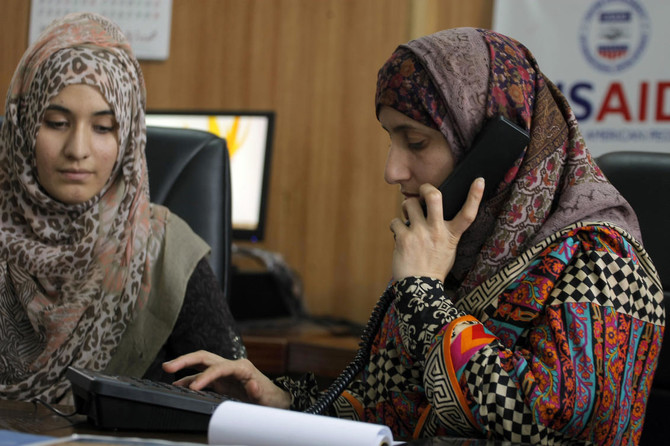
US starts building Gaza aid pier

- It is expected to be operational in early May
WASHINGTON: The US military has begun construction on a pier meant to boost deliveries of desperately needed aid to Gaza, the Pentagon said on Thursday.
The small coastal territory has been devastated by more than six months of Israeli bombardment and ground operations against Hamas militants, leaving the civilian population in need of humanitarian assistance to survive.
“I can confirm that US military vessels... have begun to construct the initial stages of the temporary pier and causeway at sea,” Pentagon spokesman Major General Pat Ryder told journalists.
Indications are that the pier will be operational in early May, and “everything is on course at this point,” he said.
Highlighting the dangers in Gaza, Ryder said that “some type of mortar attack” caused minimal damage near an onshore area that will eventually be a delivery site for aid.
The Israeli defense ministry body responsible for Palestinian civil affairs said militants fired mortars Wednesday at a humanitarian work site in northern Gaza during a visit by UN personnel, with no casualties reported.
A senior US military official told journalists that “we don’t assess that the attack had anything to do with the (aid pier) mission or delivery of humanitarian assistance from the sea.”
The military official also outlined how the maritime aid delivery process will work, saying assistance will first come into Cyprus, where it will be screened and prepared for delivery.
Aid will then be loaded onto commercial vessels for transportation to a floating platform miles off the coast of Gaza. There, it will be transferred to smaller vessels that will take the assistance to a pier that is anchored to the shore.
Trucks will then drive the aid down the platform, where a distribution partner will take it into Gaza, the official said, noting that initial operating capacity will be 90 trucks of assistance per day, later rising to 150 trucks a day.
The senior military official reiterated that there will be no US “boots on the ground,” saying an Israeli military unit will be responsible for anchoring the pier to the shore.
A senior US administration official said that the US Agency for International Development “will partner with UN organizations to deliver the life-saving aid once it gets to Gaza through the maritime corridor.”
The official painted a dire picture of the situation in Gaza and the urgent need for aid, saying “the entire population of Gaza — 2.2 million people — is facing acute food insecurity.”
“More than half of the population in northern Gaza is facing catastrophic levels of food insecurity,” while “in southern Gaza, nearly a quarter of the population is facing this kind of catastrophic food insecurity,” the official said.
Harvey Weinstein’s rape conviction is overturned by New York’s top court

- The court found the trial judge unfairly allowed testimony against Weinstein based on allegations that weren’t part of the case
- The 72-year-old ex-movie mogul, however, will remain in prison because he was convicted in Los Angeles in 2022 of another rape
NEW YORK: New York’s highest court on Thursday threw out Harvey Weinstein ‘s 2020 rape conviction with a ruling that shocked and disappointed women who celebrated historic gains during the #MeToo era and left those who testified in the case bracing for a retrial against the ex-movie mogul.
The court found the trial judge unfairly allowed testimony against Weinstein based on allegations that weren’t part of the case.
Weinstein, 72, will remain in prison because he was convicted in Los Angeles in 2022 of another rape. But the New York ruling reopens a painful chapter in America’s reckoning with sexual misconduct by powerful figures — an era that began in 2017 with a flood of allegations against Weinstein.
#MeToo advocates noted that Thursday’s ruling was based on legal technicalities and not an exoneration of Weinstein’s behavior, saying the original trial irrevocably moved the cultural needle on attitudes about sexual assault.
The Manhattan district attorney’s office said it intends to retry Weinstein, and at least one of his accusers said through her lawyer that she would testify again.
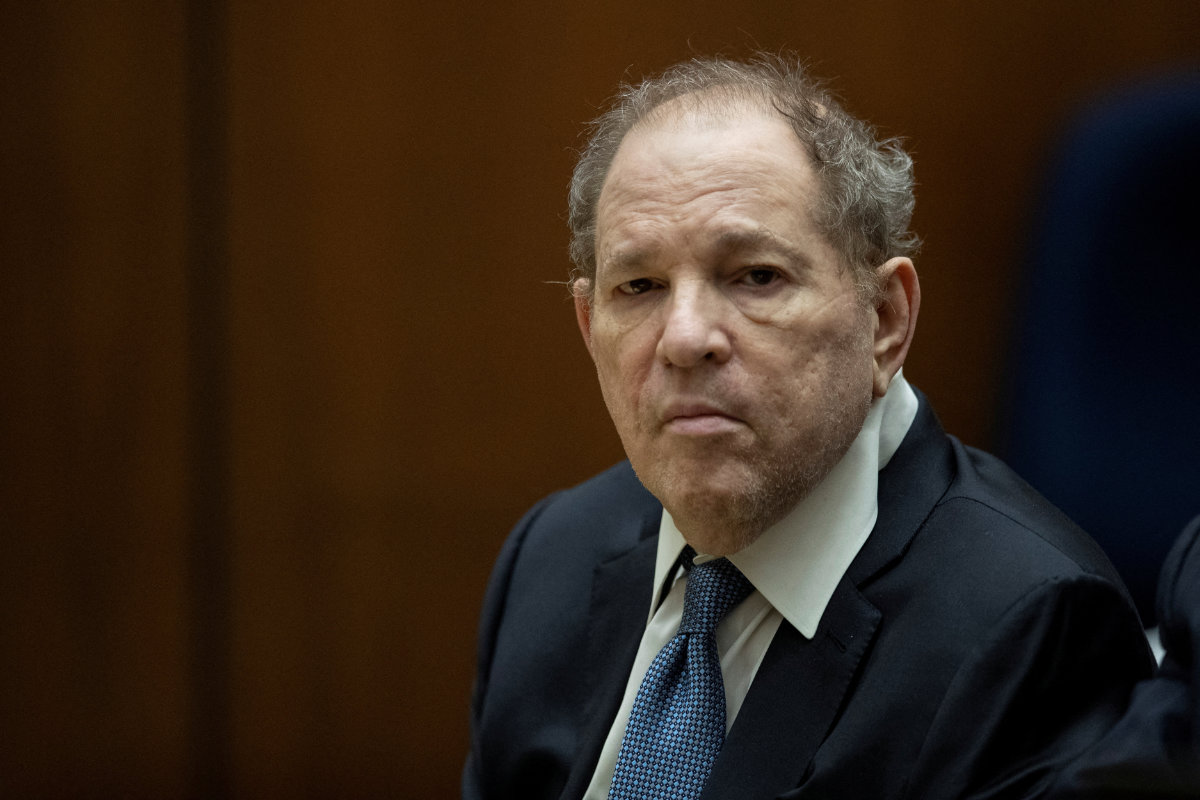
The state Court of Appeals overturned Weinstein’s 23-year sentence in a 4-3 decision, saying “the trial court erroneously admitted testimony of uncharged, alleged prior sexual acts” and permitted questions about Weinstein’s “bad behavior” if he had testified. It called this “highly prejudicial” and “an abuse of judicial discretion.”
In a stinging dissent, Judge Madeline Singas wrote that the Court of Appeals was continuing a “disturbing trend of overturning juries’ guilty verdicts in cases involving sexual violence.” She said the ruling came at “the expense and safety of women.”
In another dissent, Judge Anthony Cannataro wrote that the decision was “endangering decades of progress in this incredibly complex and nuanced area of law” regarding sex crimes after centuries of “deeply patriarchal and misogynistic legal tradition.”
The reversal of Weinstein’s conviction is the second major #MeToo setback in the last two years. The US Supreme Court refused to hear an appeal of a Pennsylvania court decision to throw out Bill Cosby’s sexual assault conviction.
Weinstein has been in a New York prison since his conviction for forcibly performing oral sex on a TV and film production assistant in 2006, and rape in the third degree for an attack on an aspiring actor in 2013. He was acquitted on the most serious charges — two counts of predatory sexual assault and first-degree rape.
He was sentenced to 16 years in prison in the Los Angeles case.
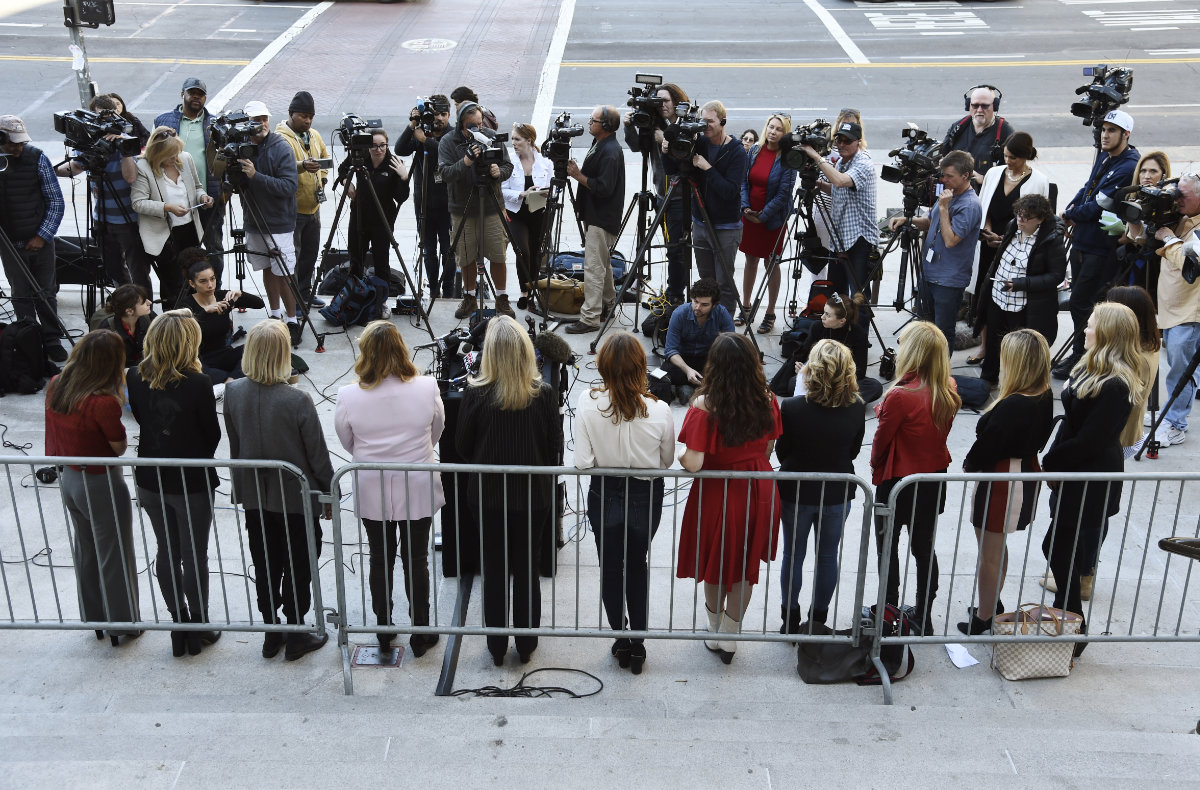
Weinstein’s lawyers expect Thursday’s ruling to have a major impact on the appeal of his Los Angeles rape conviction. Their arguments are due May 20.
Jennifer Bonjean, a Weinstein attorney, said the California prosecution also relied on evidence of uncharged conduct alleged against him.
“A jury was told in California that he was convicted in another state for rape,” Bonjean said. “Turns out he shouldn’t have been convicted and it wasn’t a fair conviction. … It interfered with his presumption of innocence in a significant way in California.”
Weinstein lawyer Arthur Aidala called the Court of Appeals ruling “a tremendous victory for every criminal defendant in the state of New York.”
Attorney Douglas H. Wigdor, who has represented eight Harvey Weinstein accusers including two witnesses at the New York criminal trial, called it “a major step back” and contrary to routine rulings by judges allowing evidence of uncharged acts to help jurors understand the intent or patterns of a defendant’s criminal behavior.
Debra Katz, a prominent civil rights and #MeToo attorney who represented several Weinstein accusers, said her clients are “feeling gutted” by the ruling, but she believes — and is telling them — that their testimony had changed the world.
“People continue to come forward, people continue to support other victims who’ve reported sexual assault and violence, and I truly believe there’s no going back from that,” Katz said. She predicted Weinstein will be convicted at a retrial and said accusers like her client Dawn Dunning feel great comfort knowing he will remain behind bars.
Dunning, a former actor who was a supporting witness at the New York trial, said in remarks to The Associated Press conveyed through Katz that she was “shocked” by the ruling and dealing with a range of emotions, including asking herself, “Was it all for naught?”
“It took two years of my life,” Dunning said. “I had to live through it every day. But would I do it again? Yes.”
She said that in confronting Weinstein, she faced her worst fear and realized he had no power over her.
Weinstein’s conviction in 2020 was heralded by activists and advocates as a milestone achievement, but dissected just as quickly by his lawyers and, later, the Court of Appeals when it heard arguments on the matter in February.
Allegations against Weinstein, the once powerful and feared studio boss behind such Oscar winners as “Pulp Fiction” and “Shakespeare in Love,” ushered in the #MeToo movement.
Dozens of women came forward to accuse Weinstein, including stars such as Ashley Judd and Uma Thurman. His New York trial drew intense publicity, with protesters chanting “rapist” outside the courthouse.
“This is what it’s like to be a woman in America, living with male entitlement to our bodies,” Judd said Thursday.
Weinstein, incarcerated at the Mohawk Correctional Facility, about 100 miles (160 kilometers) northwest of Albany, maintains his innocence. He contends any sexual activity was consensual.
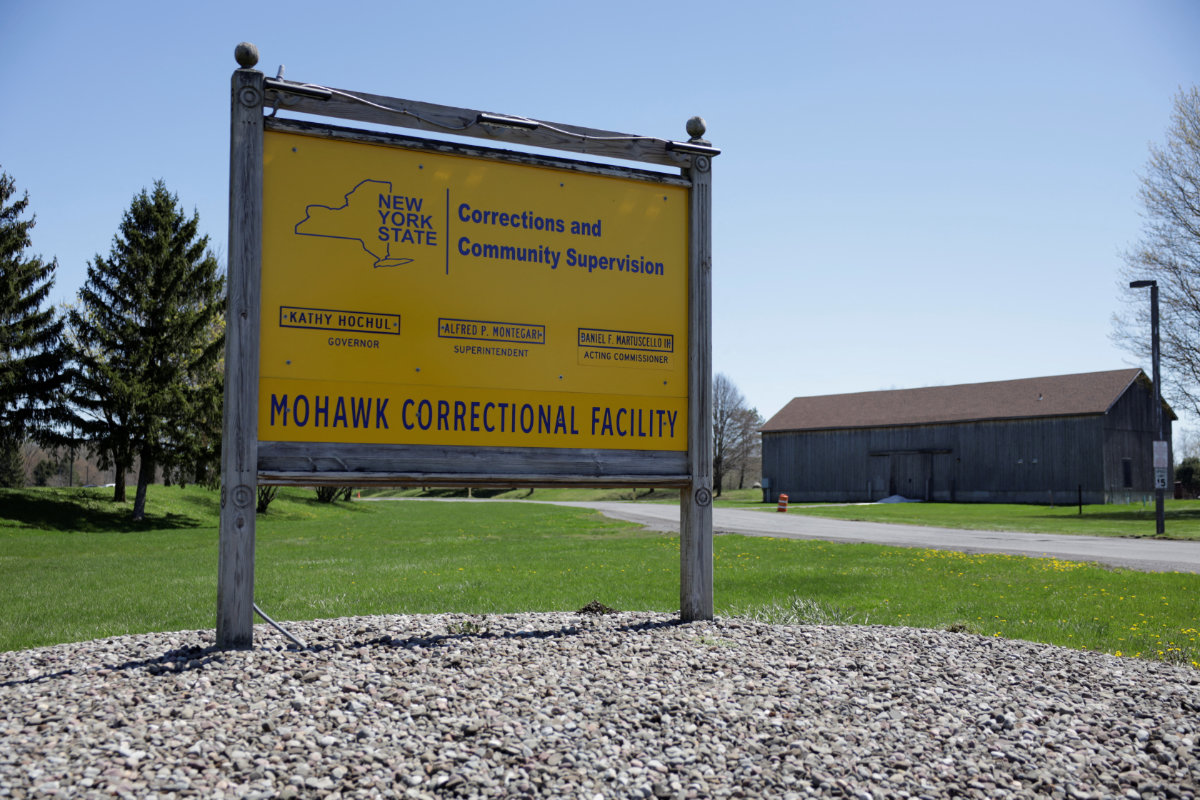
His lawyers argued on appeal that the trial overseen by Judge James Burke was unfair because testimony was allowed from three women whose claims of unwanted sexual encounters with Weinstein were not part of the charges. Burke’s term expired at the end of 2022, and he is no longer a judge.
They also appealed the judge’s ruling that prosecutors could confront Weinstein over his long history of brutish behavior, including allegations of punching his movie producer brother at a business meeting, snapping at waiters, hiding a woman’s clothes and threatening to cut off a colleague’s genitals with gardening shears.
As a result, Weinstein, who wanted to testify, did not take the stand, Aidala said.
The appeals court labeled the allegations “appalling, shameful, repulsive conduct” but warned that “destroying a defendant’s character under the guise of prosecutorial need” did not justify some trial evidence and testimony.
In a majority opinion written by Judge Jenny Rivera, the Court of Appeals said defendants have a right to be held accountable “only for the crime charged and, thus, allegations of prior bad acts may not be admitted against them for the sole purpose of establishing their propensity for criminality.”
The Court of Appeals agreed last year to take Weinstein’s case after an intermediate appeals court upheld his conviction. Prior to their ruling, judges on the lower appellate court at oral arguments had raised doubts about Burke’s conduct. One observed that Burke let prosecutors pile on with “incredibly prejudicial testimony” from additional witnesses.
At a news conference, Aidala predicted that the lasting effect of the reversal would be that more defendants will testify at their trials, including Weinstein, who “will be able to tell his side of the story.”
He said that when he spoke to Weinstein on Thursday, his client told him: “I’ve been here for years in prison for something I didn’t do. You got to fix this.”
Wave of pro-Palestinian campus protests in US meets forceful response
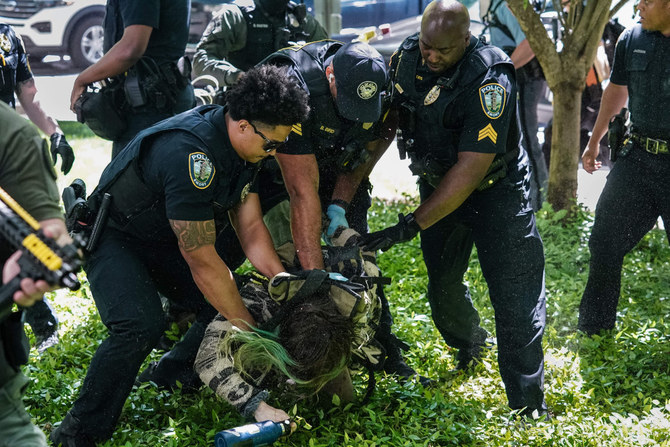
- Students protesters tasered and teargassed in Atlanta and "swept away" in Austin, Texas
- More than 530 arrests have been made in the last week across major US universities in relation to protests over Gaza
NEW YORK: Fresh clashes between police and students opposed to Israel’s war in Gaza broke out on Thursday, raising questions about forceful methods being used to shut down protests that have intensified since mass arrests at Columbia University last week.
Over the past two days, law enforcement at the behest of college administrators have deployed Tasers and tear gas against students protesters at Atlanta’s Emory University, activists say, while officers clad in riot gear and mounted on horseback have swept away demonstrations at the University of Texas in Austin.
At Columbia, the epicenter of the US protest movement, university officials are locked in a stalemate with students over the removal of a tent encampment set up two weeks ago as a protest against the Israeli offensive.
The administration, which has already allowed an initial deadline for an agreement with students to lapse, has given protesters until Friday to strike a deal.
Other universities appear determined to prevent similar, long-running demonstrations to take root, opting to work with police to shut them down quickly and in some cases, with force.
Overall, more than 530 arrests have been made in the last week across major US universities in relation to protests over Gaza, according to a Reuters tally. University authorities have said the demonstrations are often unauthorized and called on police to clear them.
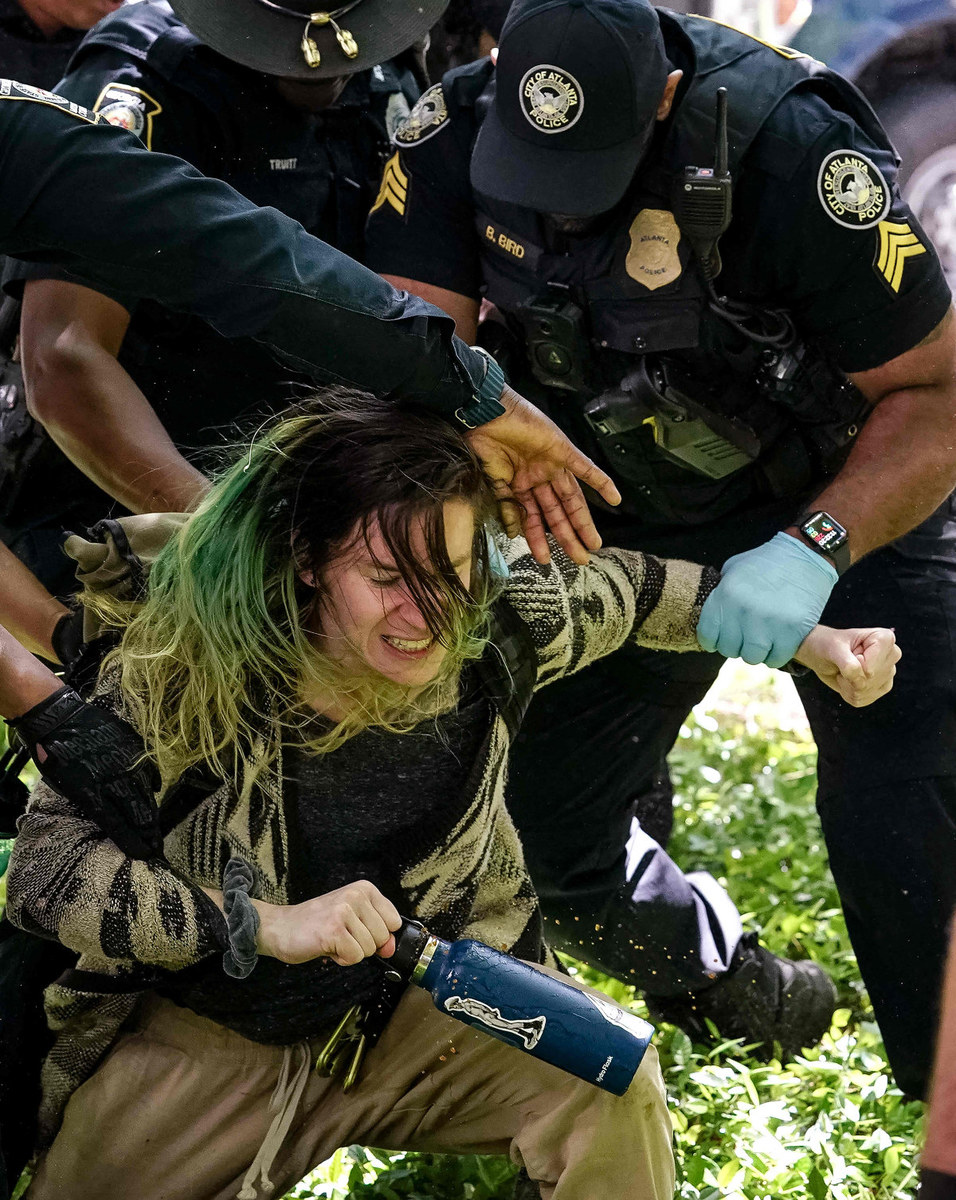
At Emory, police detained at least 15 people on its Atlanta campus, according to local media, after protesters began erecting a tent encampment in an attempt to emulate a symbol of vigilance employed by protesters at Columbia and elsewhere.
The local chapter of the activist group Jewish Voice for Peace said officers used tear gas and Tasers to dispense the demonstration and take some protesters into custody.
Video footage aired on FOX 5 Atlanta showed a melee breaking out between officers and some protesters, with officers using what appeared to be a stun gun to subdue a person and others wrestling other protesters to the ground and leading them away.
“Several dozen protesters trespassed into Emory University’s campus early Thursday morning and set up tents,” the school wrote in response to an emailed request for comment. It described the protesters as “activists attempting to disrupt our university,” but did not comment directly on the reports of violence.
Atlanta police did not immediately respond to inquiries about the number of protesters who were detained or about reports over the use of tear gas and stun guns.
Similar scenarios unfolded on the New Jersey campus of Princeton University where officers swarmed a newly-formed encampment, video footage on social media showed.
Boston police earlier forcibly removed a pro-Palestinian encampment set up by Emerson College, arresting more than 100 people, media accounts and police said. The latest clashes came a day after police in riot gear and on horseback descended on hundreds of student protesters at the University of Texas at Austin and arrested dozens of them.
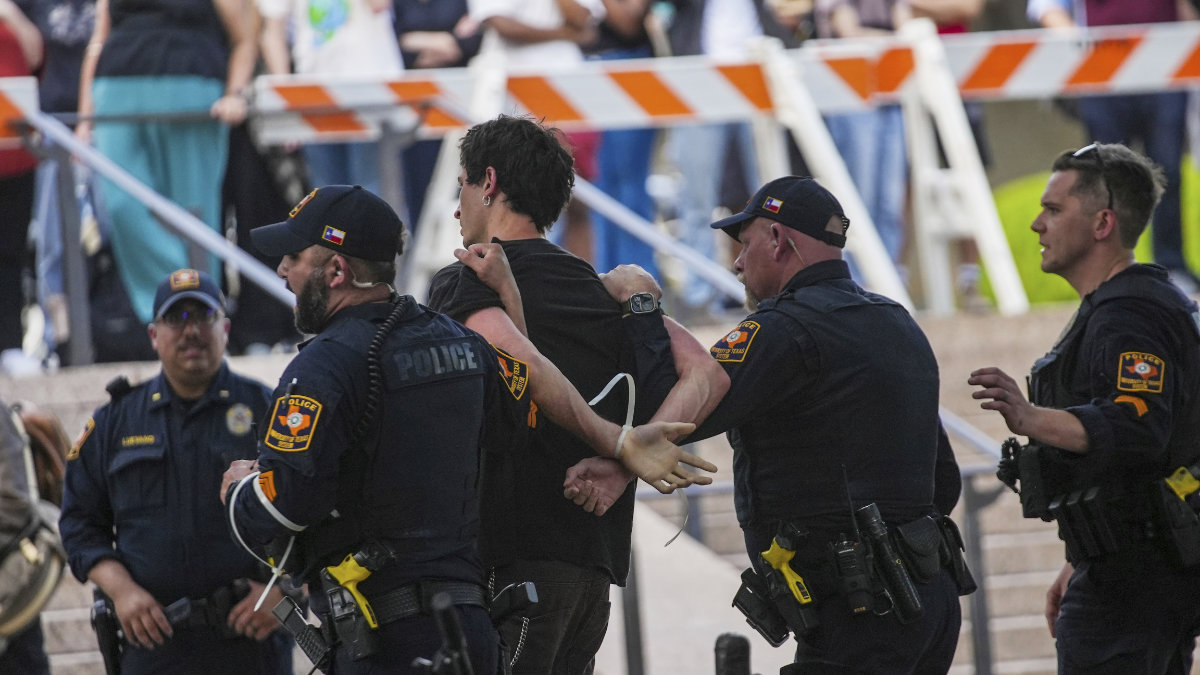
But prosecutors on Thursday dropped charges against most of the 60 people taken into custody, mostly on misdemeanor charges of criminal trespassing and disorderly conduct, and said they would proceed with only 14 of those cases.
In dropping the charges, the Travis County district attorney cited “deficiencies in the probable cause affidavits.”
‘Alarming reports’
Human Rights Watch and the American Civil Liberties Union have condemned the arrest of protesters and urged authorities to respect their free speech rights.
But some Republicans in Congress have accused university administrators of allowing Jewish students to be harassed, putting increasing pressure on schools to tightly control any demonstrations and to block any semi-permanent encampment.
US Education Secretary Miguel Cardona on Thursday said his department was closely monitoring the protests, including what he called “very alarming reports of antisemitism.”
In response, activist groups have strongly denied that the protests are antisemitic. Their aim is to pressure universities from divesting from companies that contribute to the Israeli military actions in Gaza, they say.
Even so, protest leaders have acknowledged that hateful rhetoric has been directed at Jewish students, but insist that people who tried to infiltrate and malign their movement are responsible for any harassment.

Friday deadline at Columbia
At Columbia, officials have given protesters until 4 a.m. on Friday to reach an agreement with the university on dismantling dozens of tents set up on the New York City campus in a protest that started a week ago.
An initial deadline of midnight Tuesday came and went without an agreement, but administrators extended it for 48 hours, citing progress in the talks.
The university already tried to shut the protest down by force. On April 18, Columbia President Minouche Shafik took the unusual move of asking police to enter the campus, drawing the ire of many rights groups, students and faculty.
More than 100 people were arrested and the tents were removed from the main lawn. But within a few days, the encampment was back in place, and the university’s options appeared to narrow.
Protesters have vowed to keep the protests going until their universities agree to disclose and divest any financial holdings that might support the war in Gaza, and grant amnesty to students suspended from school during the demonstrations.
Student protesters have also demanded that the US government rein in Israeli strikes on civilians in Gaza, which have killed more than 34,000 people, according to Palestinian health authorities. Israel is retaliating against an Oct. 7 Hamas attack that killed 1,200 people and led to 253 taken hostage, according to Israeli tallies.
Macron blasts ‘ineffective’ UK Rwanda deportation law

PARIS: French President Emmanuel Macron on Thursday said Britain’s plan to send asylum seekers to Rwanda was “ineffective” and showed “cynicism” while praising the two countries’ cooperation on defense.
“I don’t believe in the model ... which would involve finding third countries on the African continent or elsewhere where we’d send people who arrive on our soil illegally, who don’t come from these countries,” Macron said.
“We’re creating a geopolitics of cynicism which betrays our values and will build new dependencies, and which will prove completely ineffective,” he added in a wide-ranging speech on the future of the European Union at Paris’ Sorbonne University.
British MPs on Tuesday passed a law providing for undocumented asylum seekers to be sent to Rwanda, where their asylum claims would be processed and where they would stay if the claims succeed.
The law is a flagship policy for Prime Minister Rishi Sunak’s government, which badly lags the opposition Labour Party in the polls, with an election expected within months.
Britain pays Paris to support policing of France’s northern coast, which aims to prevent migrants from setting off for perilous crossings in small boats.
Five people, including one child, were killed in an attempted crossing Tuesday, bringing the toll on the route so far this year to 15 — already higher than the 12 deaths in 2023.
But Macron had warm words for London when he praised the two NATO allies’ bilateral military cooperation, which endured through the contentious years of Britain’s departure from the EU.
“The British are deep natural allies (for France), and the treaties that bind us together ... lay a solid foundation,” he said.
“We have to follow them up and strengthen them because Brexit has not affected this relationship,” Macron added.
The president also said France should seek similar “partnerships” with fellow EU members.
US alarmed by signs of ‘imminent military offensive’ in Darfur

WASHINGTON: The US has warned of a looming rebel military offensive on the Sudanese city of El-Fasher. This humanitarian hub appears to be at the center of a newly opening front in the country’s civil war.
After a year of fighting between the armed forces of Gen. Abdel Fattah Al-Burhan and the paramilitaries of the Rapid Support Forces, under Gen. Mohammed Hamdan Dagalo, millions have been displaced in the northeastern African country.
Until recently, El-Fasher — the last Darfur state capital not under RSF control — had been relatively unaffected by the fighting, hosting a large number of refugees.
But since mid-April, bombardments and clashes have been reported in the city and surrounding villages. The US “calls on all armed forces in Sudan to immediately cease attacks in El-Fasher,” the State Department said.
“We are alarmed by indications of an imminent offensive by the Rapid Support Forces and its affiliated militias,” it said, adding that “an offensive against El-Fasher city would subject civilians to extreme danger.”
After several days of “arbitrary shelling and airstrikes” in the city and its outskirts, a pro-democracy lawyers’ committee reported last week that at least 25 civilians had been killed.
Clashes in the eastern and northern parts of the city have already resulted in 36,000 displaced people, according to the UN’s Office for the Coordination of Humanitarian Affairs.
As the war enters its second year, the UN and US have warned the breakdown of the fragile peace in El-Fasher would be catastrophic.
The city functions as the main humanitarian hub in the vast western region of Darfur, home to around a quarter of Sudan’s 48 million people and the site of harrowing violence during this and previous conflicts.
The State Department said it had seen “credible reports” that the RSF and affiliated militias had razed multiple villages west of the city, while it condemned “reported indiscriminate aerial bombardments” in the region by Sudan’s armed forces.





